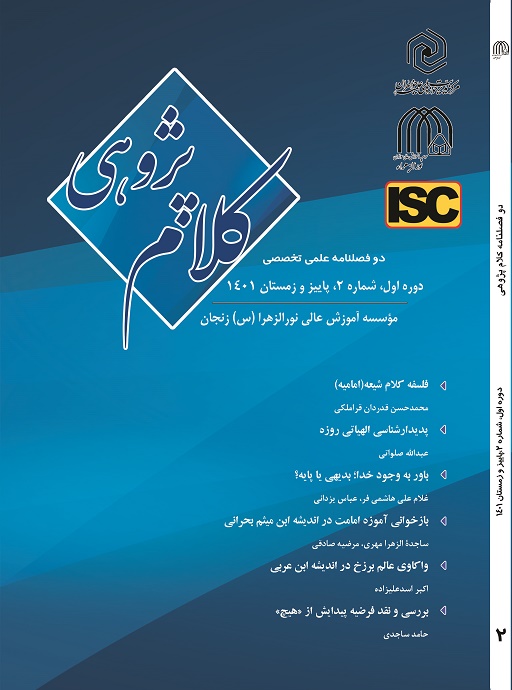نوع مقاله : مقاله پژوهشی
نویسندگان
1 گروه فلسفه و کلام، دانشگاه ادیان و مذاهب، قم، ایران
2 استادیار گروه فلسفه و کلام، دانشگاه ادیان و مذاهب، قم، ایران.
3 دانش اموخته سطح 3 حوزه علمیه قم و دانشآموخته موسسه آموطش عالی امام خمینی، الهیات و معارف اسلامی گرایش علوم قرآن و حدیث.
چکیده
خواب و رویا از جمله مسائلی است که فیلسوفان بسیاری در پی آشکار کردن حقیقت آن بَرآمدهاند. ارسطو با نگاهی طبیعتگرایانه، رویا را حاصل خیال و عمل ذهن میداند، در حالی که کندی رویا را یکی از راههای اتصال به عالم غیب و شهود میداند. هر دو فیلسوف تاحدودی با یکدیگر همنظر بوده و جایگاه ظهور رویا را یکی از آثار قوه متخّیله و نتیجه آن میدانند، امّا تفاوتهایی وجود دارد. کندی با اعتقادی شورمندانه رویا را حاصل فاصله گرفتن نفس از حواس بدنی و ظاهری و تمایل به سمت قوای باطنی میداند، به طوری که در عالم خواب و رویا گاهی انسان موفق به درک حقایق هستی و دستیابی به وقایع آینده میشود؛ و از این رهگذر، به ادراک و معرفت شهودی دست مییابد، ولی ارسطو با رَد انگاره ارسال رویا از جانب خدا میکوشد تا خود را از تفسیرهای دینی دورنگه دارد. این پژوهش با رویکرد توصیفی_تحلیلی به بررسی مقایسهگونه آرای این دو فیلسوف بَرآمده و با نشان دادن وجوه افتراق و اشتراک آنان به میزان تاثیرپذیری کندی از نظریه ارسطو میپردازد. یافتههای پژوهش نشان میدهد که کندی با تاثر از فرآیند فیزیولوژیکی ارسطو و با دقت نظر بیشتر در این مسئله نظریه ارسطو را تعدیل کرده و از دیدگاه او فاصله میگیرد.
کلیدواژهها
عنوان مقاله [English]
Analyzing the philosophical foundations of sleep and dreams from the point of view of Aristotle and Kendy
نویسندگان [English]
- fatemeh akbarzadeh najjar 1
- Mohammad (Jalal AL-Din) Maleki 2
- Mohammad akbarzadeh najjar 3
1 Philosophy and Theology, University of Religions and Religions, Qom, Iran
2 Assistant Professor, Department of Philosophy and Theology, University of Religions and Religions, Qom, Iran.
3 3rd level scholar of Qom seminary and scholar of Imam Khomeini's Amutash Institute, theology and Islamic education, majoring in Quranic and Hadith sciences.
چکیده [English]
Sleep and dreams are among the issues that many philosophers have come up with in order to reveal its truth. Aristotle, with a naturalistic view, considers the dream to be the result of the imagination and action of the mind, while Kendy considers the dream to be one of the ways to connect to the unseen world and intuition. Both philosophers agree with each other to some extent and consider the appearance of dreams as one of the works of imagination and its result, but there are differences. Kandi, with a passionate belief, considers dreams to be the result of the soul distancing itself from the physical and external senses and the tendency towards inner powers, so that in the world of sleep and dreams, sometimes a person succeeds in understanding the truths of existence and achieving future events; And through this path, he achieves intuitive perception and knowledge, but Aristotle tries to distance himself from religious interpretations by rejecting the idea of sending a dream from God. This research, with a descriptive-analytical approach, investigates the opinions of these two prominent philosophers in a comparative manner, and by showing their differences and commonalities, it deals with the extent to which Kendy was influenced by Aristotle's theory. The findings of the research show that Kendy modified Aristotle's theory with the impression of Aristotle's physiological process and with more precision in this issue and distanced himself from his point of view.
کلیدواژهها [English]
- Sleep
- dream
- imagination
- breath
- Aristotle
- slowness

